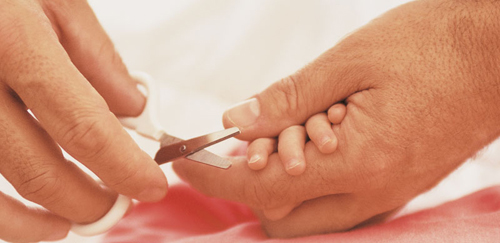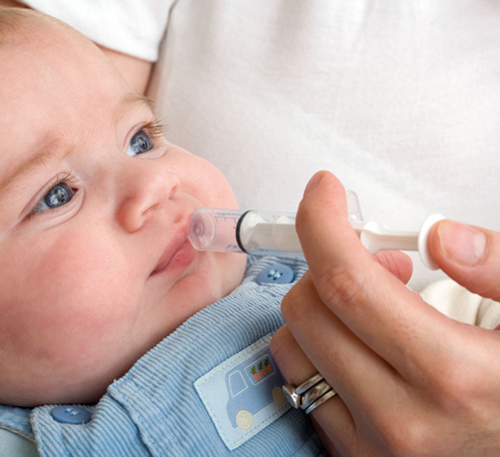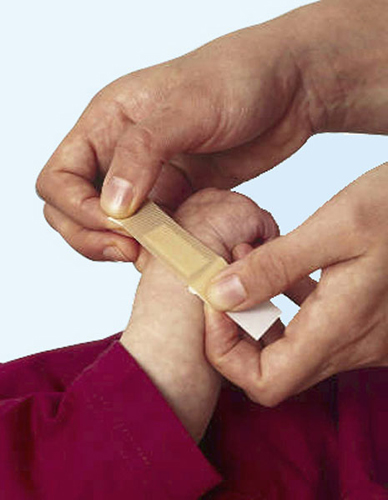Your Baby’s Nursery
This is where the fun
starts! Although the expense of furnishing a nursery can be daunting,
most parents enjoy the process of decorating. There are plenty of ways
to get the baby equipment you need on a budget, and also lots of things
to bear in mind to ensure that the décor is safe for your new baby.
Nursery equipment
A Moses basket, crib, or bassinet (optional)—many babies sleep better in small confines in the early days, but these are soon outgrown A full-sized crib, with a new mattress—you
may wish to use receiving blankets to swaddle your baby, to make her
feel cozier. You can also purchase a crib divider that attaches to the
crib with Velcro tabs Bedding:
3 mattress pads, 3 fitted sheets, 2–3 blankets (if you use blankets,
tuck three sides under the mattress and position at or below the baby’s
chest); crib bumpers and heavy blankets are a suffocation risk Changing area—a
purpose-built changing table is not essential; any hard surface at hip
height will work, including the top of your baby’s dresser or your
baby’s crib; the safest place to change your baby is on the floor Changing mat—go for one that is easily washed
Baby monitor
Basic toiletries
Newborn diapers
Mobile over the baby’s crib Music box to play soothing tunes Soft rug or mat made of natural fibers, for tummy time and playtime Bouncy seat, which can be moved from room to room
Night light
Black-out shade to ensure your baby’s sleep is not disturbed by sunlight Comfortable chair for feeding or nighttime comforting Dresser for storage (some cribs have built-in storage) Diaper pail—preferably with a tight-fitting lid
Decorating
Choose a low- or zero-VOC
(volatile organic compound) paint, which does not contain the unhealthy
chemicals contained in traditional paints; or go for natural paints
made from water, clay, chalk, plant dyes, and beeswax Opt for hardwood flooring
paired with a rug made of natural fibers, or choose a low-VOC carpet,
and clean with a HEPA-filtered vacuum cleaner—carpets harbor dust mites,
dirt, and allergens, and emit VOCs into the air Choose all-wood furniture with non-toxic finishes; furniture made from particle boards or veneers can release gases such as formaldehyde Make sure there are no strings, electrical sockets, or electrical cords near your baby Give the ceiling some consideration: if there is something stenciled or painted on, or hanging from the ceiling, it will fascinate your baby
Your baby’s crib
Choose a frame with a non-toxic finish, such as beeswax A crib with adjustable height will ensure that your baby can use it until she is ready to move into a bed Choose a drop-side crib, which will allow lifting access without placing undue strain on your back Even if your crib is secondhand, buy a new mattress—look
for one with all-organic cotton filling or wool casings, and avoid
mattresses that contain the fire-retardant polybrominated diphenyl
ethers (PBDEs) Bedding should be washable, and preferably 100 percent organic cotton; it should never contain flame-retardant PBDEs Teething rails can help prevent damage to the crib when your baby starts to look for things to chew on
Your Baby’s Medicine Cabinet
Putting together a
well-stocked medicine cabinet will ensure that you are ready when
illness or discomfort strike. Keep everything together in one place,
well out of reach of little fingers. You won’t need all these items
right away, but it’s good to be prepared.
Diaper rash cream—rashes
are inevitable for babies; diaper creams containing zinc oxide are best
for soothing irritated skin and providing a barrier Petroleum jelly—this
is useful for dry skin, diaper rash, and eczema, and provides a good
barrier; if you prefer to avoid petroleum products, look for a natural
balm that contains beeswax
Teething gel
Baby acetaminophen, which is good for fevers and pain relief—it’s usually only appropriate after two months of age; always read the label A rehydration solution—use this on the advice of your healthcare professional in the event of diarrhea or vomiting Antibacterial cream for cuts and scrapes Baby-safe sunscreen—preferably organic Medicine syringe or dropper, to ensure that your baby gets the right dosage, and you can squirt it in gently
Nail clippers or scissors
A thermometer—there are a number of varieties available Cotton swabs to clean the folds of the outer ear (never put these inside the inner ear canal) Cotton balls to clean the eyes and wipe away any buildup on the neck folds Band-Aids and adhesive bandages in both baby and child sizes A good first-aid manual specialized for the treatment of babies and children



|